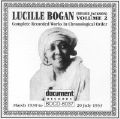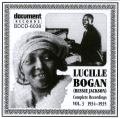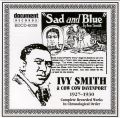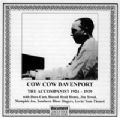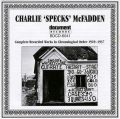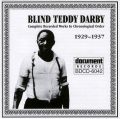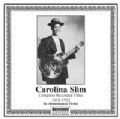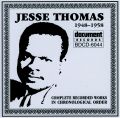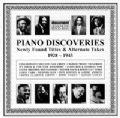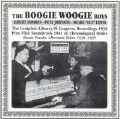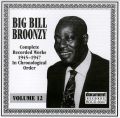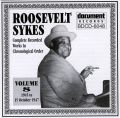"Document 6000 Series "
Viewing 37 to 48 of 50
|
Lucille Bogan Vol 2 1930 - 1933 More Info on our New Store >> |
||
|
Lucille Bogan Vol 3 1934 - 1935 The third and final volume of Lucille Bogan’s complete works as presented by Document allows the listener to savor 23 recordings made between July 1934 and March 1935, with pianist Walter Roland, and guitarists Bob Campbell and Josh White. It was during this period that Bogan chose to record under the name of Bessie Jackson.
You Got to Die Some Day has a familiar ring to it, and might well be the source for a line in Eddie Durham and Jimmy Rushing’s “Sent for You Yesterday,” a major hit for Count Basie and other big-band leaders during the late 1930s. I Hate That Train Called the M. and O. is one of several Bogan songs inspired by locomotives. Because this particular train separated her from the man that she loved, the emotions expressed here are undiluted and powerfully direct. Pig Iron Sally, like the train songs rooted in the industrialized territory where she lived and worked, is the testimony of a woman who protects herself by claiming to be filled with Evil. The underlying message is as clear and concise as a crossbow: “Do Not Mess with Me.” Continued...
More Info on our New Store >> |
||
|
Ivy Smith & Cow Cow Davenport 1927 - 1930 Virtually nothing is known about blues singer Ivy Smith. She recorded with Cow Cow Davenport (not only on her own sessions but guesting on some of his selections) and was in an unsuccessful road show organized by the pianist-singer called “The Cow Cow Steppers”. Otherwise she is lost to history. Continued... Note: See also Document Records DOCD-5141, DOCD-5142 and DOCD-5586. More Info on our New Store >> |
||
|
Cow Cow Davenport The Accompanist 1924 - 1929 Like many African American pianists of his generation, Cow Cow Davenport made ends meet during the 1920s by providing accompaniment for blues and jazz vocalists in established or temporary recording studios. In order to illustrate this aspect of his career and bring more rare material out of the woodwork, 22 sides cut during the years 1924-1929 were reissued by Document in 1994. Continued... More Info on our New Store >> |
||
|
Charlie (Specks) McFadden 1929 - 1937 Charlie “Specks” McFadden was not destined to become famous, but at the time he made his debut recordings in 1929, he was considered one of the top blues-oriented singers based in St. Louis. A good friend of Roosevelt Sykes, who plays piano on 12 of the 20 selections included on this CD, McFadden was a fine blues singer. He had a minor hit with Groceries on the Shelf which has three versions included on this disc. Apparently, McFadden was quite a character, being arrested 13 times during 1929-1935, including ten times for gambling, which gives credibility to his version of Gambler’s Blues. Continued... More Info on our New Store >> |
||
|
Blind Teddy Darby 1929 - 1937 With the exception of two songs that have not been found, the complete recordings of singer/guitarist Blind Teddy Darby are on this CD. An expressive if not overly memorable singer, Darby appeared on 20 selections recorded at five sessions (one apiece for Paramount, Victor, Bluebird, Vocalion, and Decca) that took place two years apart from each other. The instrumentation and personnel changed from session to session, ranging from unaccompanied performances by Darby to a jam on What Am I to Do that includes cornetist Baby Jay, trombonist Ike Rodgers, and pianist Roosevelt Sykes. This CD gives collectors a chance to very easily have the lifework of an obscure but worthy blues performer. - Scott Yanow More Info on our New Store >> |
||
|
Carolina Slim - Complete Recorded Titles 1950 - 1952 Carolina Slim; vocal, guitar. Genres; Post-war Country Blues, North Carolina blues, Blues guitar. Abridged booklet notes. More Info on our New Store >> |
||
|
Jesse Thomas 1948 - 1958 This 28-song compilation is a serious listening workout, in the best possible meaning of the description. Assembled here are all of the post-World War II sides by Jesse Thomas, recorded variously for Miltone Records, his own short-lived Club label, Freedom, Modern, Swing Time, Specialty, Elko, and Hollywood, across a period of ten years. This was a period in which Thomas embraced a vast range of sounds, all of them with remarkable effectiveness but without a lot of consistency. One of Thomas' virtues and problems was that he may have been too versatile for his own good — based on the evidence of this collection, on which no two groups of recordings, even done within the same year (albeit for different labels) sound the same, he seems not to have stuck with a sound long enough to have built an audience. More Info on our New Store >> |
||
|
Piano Discoveries 1928 - 1943
This compilation disc contains an astonishing array of blues and boogie-woogie piano artists that will be of interest to anyone who has an ear for this genre of music. Some of the selections are outtakes, while others are never-before-released recordings. The latter are from vinyl records that were made in the ’40s. Among the artists featured are Lee Green, Judson Brown with Charlie “Bozo” Nicherson, Leroy Carr with Scrapper Blackwell, Charles “Cow Cow” Davenport, Georgia Tom with Tampa Red, Memphis Slim, Little Brother Montgomery, Roosevelt Sykes with Walter Davis, Thomas A. Dorsy, Ivy Smith, Ezra Howelett Shelton, Cripple Clarence Lofton, Jimmy and Mama Yancey, and Alonzo Yancey. The quality of the recordings is variable, but listening to them is still worthwhile for their historical and musical value. The repertoire ranges from the well-known The Girl I’m Looking For, Beer Drinking Woman, and Church House Blues to the more obscure Mama and Jimmy Blues, Deep End Boogie, and Poor Old Bachelor Blues. Dialogue by various artists is interspersed throughout this fascinating historical document. – Rose of Sharon Witmer. More Info on our New Store >> |
||
|
The Boogie Woogie Boys - 1938 & 1941 The Complete Library of Congress Recordings 1938. Plus Film Soundtracks 1941. Bonus Tracks; Alternative Takes 1936 - 1939.
More Info on our New Store >> |
||
|
Big Bill Broonzy Vol 12 1945 - 1947
More Info on our New Store >> |
||
|
Roosevelt Sykes Vol 8 1945 - 1947 Volume eight in the complete recordings of Roosevelt Sykes as reissued by Document covers his Victor/Bluebird output from 1945 through October 1947. During this portion of his lengthy career, Sykes brought in some of Chicago's toughest sessionmen, including a brace of horn players who fortified the texture of his act and summoned a jazz element that blended well with his steadily ripening approach to blues and boogie-woogie. Sykes' saxophonists on this collection have been identified as J.T. Brown, Bill Casimir, Calmes Julian, Oett "Sax" Mallard, Martin Rough, and Leon Washington. He also used trumpeters Lucius Henderson and Johnny Morton, as well as a clarinetist by the name of Johnny Walker, and quite an assortment of guitarists, bassists, and drummers. Sykes, who made his first recordings in 1929 and continued to perform until shortly before his death in 1983, was most often heard as soloist or leader of small rhythm combos. That makes his bristly post-war sessions all the more intriguing, as wind instruments add extra layers to his already substantial weave of visceral vocals and double-fisted piano. – arwulf arwulf.
More Info on our New Store >> |
||

